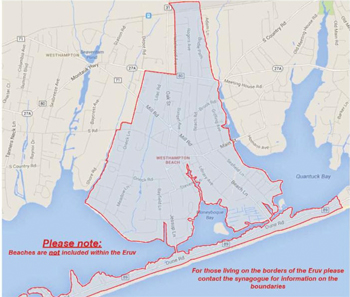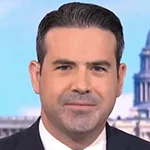Prof. Charlotte Fonrobert of Stanford University says the fact that maps of eruvim Jewish boundaries are now online cancels claims of their being “nearly invisible” and “unobtrusive,” as noted in legal decisions.
 Map shows eruv around Westhampton Beach. Map shows eruv around Westhampton Beach. |
Her paper, published Jan. 30, 2015 and found in a collection of materials on the eruv compiled by Southampton, focuses on the battle in Westhampton Beach over erection of such a boundary, quoting opposition by Jewish People Opposed to the Eruv. It notes that “The Daily Show” aired a segment on the dispute.
Writes Fonrobert:
“The very fact that now an eruv installation takes the form of inscriptions on maps, readily accessible online, clearly provides conceptual fodder for the perception that the Jewish community is laying claim to a geographical area of a town.
“Drawing maps of urban areas based on religious identity and practice is a form of laying claim to public space, however symbolic that may be. The fact that no one can see the plastic strips becomes totally insignificant in the light of that.”
Appeals Decision Noted “Inconspicuous Strips”
The Jan. 6, 2015 U.S. Court of Appeals decision upholding the right of the East End Eruv Assn. to erect an eruv in Westhampton Beach, repeatedly refers to the alleged near-invisibility of the eruv.
The “lechi” markers that are used for the eruv are referred to as “inconspicuous strips.” EEEA, the decision notes, says the WHB eruv is “far less obtrusive” than other religious displays and the markers do not “convey any message to the uninitiated.”
“Plaintiffs do not allege that these staves contain any overtly religious features that would distinguish them to a casual observer as any different from strips of material that might be attached to utility poles for secular purposes,” the decision further says.
The Hampton Synagogue, which sought an eruv in WHB in 2008 but withdrew the quest after community opposition appeared, letting the EEEA pursue the issue, shows the eruv on its website.
Fonrobert says that lechi markers “are not readable in the way a cross is readable to the public or even a menorah or a crèche are readable, because they signify something in and of themselves. Compared to church, synagogue, and mosque buildings, and their minarets and steeples, the eruv constitutes a minimalist intervention and manipulation of, the built environment.
“Thus, the lechis mean nothing other than to those who rely on them as to their Sabbath observance. Arguably, however, it might be beyond the Court’s jurisdiction to figure what it is that constitutes a ‘religious’ symbol.”
The 2002 U.S. Appeals Court decision that over-ruled a lower court’s decision on an eruv in Tenafly, N.J., noted that the Tenafly Eruv Assn. claimed that an eruv is “not a religious symbol” but rather an item with “religious significance.”
Susman Said Eruvim Unconstitutional
Prof. Alexandra Susman of UCLA Law School in 2009 authored a 34-page paper on eruvim in which she declared them to be unconstitutional.
Prof. Marci Hamilton of the Benjamin N. Cardozo Law School of Yeshiva University, New York, authored a paper for WHB in 2008 in which she argued the same point.
WHB has been “vigilant and consistent in enforcing its laws against posting signs on utility poles” and the situation is “decidedly unlike Tenafly, where, according to the Court, the local government failed to enforce its sign laws evenhandedly,” Hamilton wrote.
She added that allowing lechis on utility poles in WHB “would open the door for the Synagogue and others to fill the utility poles with signs of every size, shape and description.”
WHB Candidates Asked for Views
The JPOE has emailed the four candidates who are running for the post of trustee of WHB in the June 19 election asking them to voice their opposition to demands by EEEA and Verizon that WHB permanently agree not to oppose an eruv in the village.
Residents have been asked to email the following to Mayor Marie Moore, who has declined to comment on the eruv litigation, and to the four candidates, incumbents Hank Tucker and Patricia DiBenedetto, and challengers Ron Rubio and Brian Tymann:
“I strongly oppose the granting of any waiver or exemption from any present or future Village ordinance regulation or requirement to Verizon or the East End Eruv Assn. Further, I oppose the granting of any permission for Verizon to make a licensing agreement with EEEA for the erection of lechis on utility poles in the Village of Westhampton Beach for for the EEEA to erect lechis on said poles.”
Tymann provided the following statement today and Rubio agreed with it.
I do indeed “strongly oppose granting of any waiver or exemption from any present or future WHB ordinance, regulation or requirement to Verizon or the East End Eruv Assn.”
We are against lifetime medical plans for trustees who currently enjoy that benefit after ten years of service.
Regarding the eruv/lechis, I don’t have a firm answer on those until I consult with the legal team working on this. I can however say that I personally do not support the general concept of religious demarcations on public property.
Same goes for CVS (a drug store seeking to open in WHB). I need to be updated on the status of the change of zone as it relates to the granting of a special exception to consider allowing CVS there. I do not have that information.
While personal opinions are important in a leadership role, understanding the laws and getting legal counsel on important issues such as this are essential in making solid decisions and I won’t give decisive opinions on things that I do not have complete information on yet.
Rabbi Schneier Rap Expulsion from Council
The Forward, formerly the Jewish Daily Forward, reported today that Rabbi Marc Schneier has been expelled from the Rabbinic Council of America.
The Forward previously had been unable to confirm the report. It says that Schneier has been informed of the decision by the Council. The New York Times has yet to cover the story.
The Forward then quoted Schneier as saying that the Council had reneged on a promise related to the charges of marital infideiity that were leveled against him. He said he reached agreement with the Council's ethics committee that he would write a letter of apology and the charges would be dismissed. He noted the letter had been sent to the wrong address. He said the Council should have contacted him about the expulsion. "The absurdity that you can't find Marc Schneier? Give me a beak," he is quoted as saying. Schneier also noted he has a "serious bipolar disorder" and this could be a reason for the alleged misconduct.
Morris Tuchman, the shul's board president, said, "We are very proud of Rabbi Schneier's achievements and are considering no action as a result of this RCA debacle." Schneier has no plans to leave the Synagogue and hasn't decided if he will take action against the RCA.


 Husch Blackwell Strategies has added FleishmanHillard alum Michael Slatin as a principal in its public affairs group.
Husch Blackwell Strategies has added FleishmanHillard alum Michael Slatin as a principal in its public affairs group. Rory Cooper, a veteran Republican operative and policy specialist, has joined Teneo’s Washington office as senior managing director in its strategy & communications practice.
Rory Cooper, a veteran Republican operative and policy specialist, has joined Teneo’s Washington office as senior managing director in its strategy & communications practice. Brian Fallon, who served as national press secretary for Hillary Clinton’s 2016 presidential run, is signing on next month as Vice President’s Kamala Harris’ campaign communications director.
Brian Fallon, who served as national press secretary for Hillary Clinton’s 2016 presidential run, is signing on next month as Vice President’s Kamala Harris’ campaign communications director. TikTok is nothing more than a Chinese propaganda tool that poses “a grave threat to America’s national security and, in particular, impressionable children and young adults,” say two Congressmen who want the platform registered as a foreign agent.
TikTok is nothing more than a Chinese propaganda tool that poses “a grave threat to America’s national security and, in particular, impressionable children and young adults,” say two Congressmen who want the platform registered as a foreign agent. Public Strategies Washington has added Abbie Sorrendino, a former aide to now Senate Majority Leader Chuck Schumer.
Public Strategies Washington has added Abbie Sorrendino, a former aide to now Senate Majority Leader Chuck Schumer.


 Have a comment? Send it to
Have a comment? Send it to 
No comments have been submitted for this story yet.